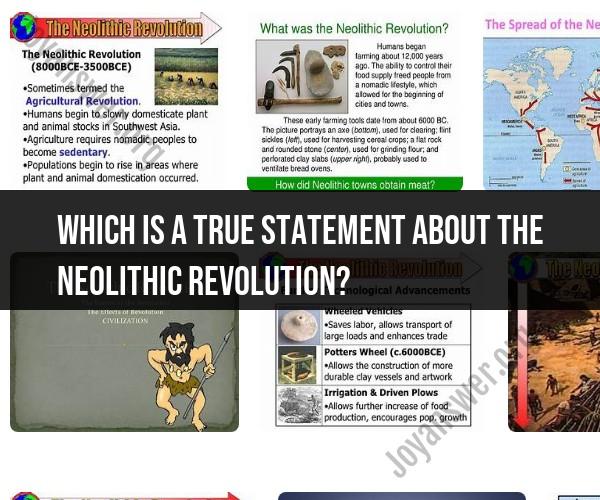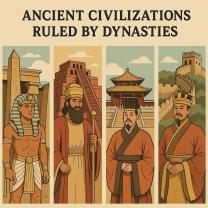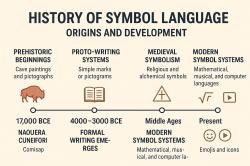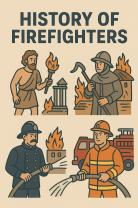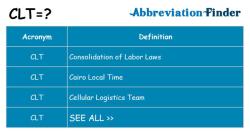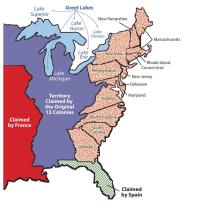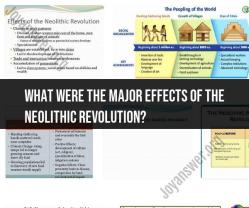Which is a true statement about the Neolithic Revolution?
The Neolithic Revolution was a significant turning point in human history, marked by the transition from a nomadic, hunter-gatherer lifestyle to settled agriculture and the domestication of animals. Several true statements about the Neolithic Revolution include:
Agricultural Innovation: The Neolithic Revolution is characterized by the development of agriculture. People began to cultivate crops such as wheat, barley, and legumes and to domesticate animals like goats, sheep, and cattle.
Shift from Nomadic to Sedentary Lifestyle: Before the Neolithic Revolution, early humans were primarily nomadic, moving from one place to another in search of food. With the advent of agriculture, communities became more settled, establishing permanent dwellings and villages.
Surplus Food Production: Agriculture allowed for a more reliable and abundant food supply. As a result, communities could produce a surplus of food, which led to population growth and the emergence of specialized roles in society beyond hunting and gathering.
Development of Pottery and Tools: With the need for storing and processing food, humans developed pottery and improved tools for farming and other activities. These technological advances were crucial to the success of early agricultural societies.
Social and Economic Changes: The Neolithic Revolution brought about changes in social organization and economics. People began to trade goods, form complex societies, and establish more permanent settlements with political and economic hierarchies.
Creation of Permanent Settlements: The transition to agriculture led to the establishment of permanent villages and eventually cities. These settlements played a fundamental role in shaping human civilization and culture.
Impact on Human Health: While agriculture provided a stable food source, it also brought new challenges, such as diseases associated with close contact with domesticated animals and changes in diet. However, it contributed to the overall growth of the human population.
Environmental Impact: The shift to agriculture also had significant environmental effects, including deforestation, soil erosion, and changes in ecosystems.
Long-Term Historical Significance: The Neolithic Revolution is considered one of the most important developments in human history. It laid the foundation for modern agriculture, the rise of civilizations, and the growth of human populations.
The Neolithic Revolution was a transformative period that set the stage for the development of complex societies, technological advancements, and changes in how humans interacted with their environment. These changes had a profound and lasting impact on human history.
The Neolithic Revolution: Separating Fact from Myth
The Neolithic Revolution is one of the most important events in human history. It was the transition from a hunter-gatherer lifestyle to an agricultural lifestyle, and it led to the development of complex civilizations.
However, there are many myths and misconceptions about the Neolithic Revolution. For example, some people believe that it was a sudden and dramatic change, while others believe that it was a gradual process that took place over thousands of years.
The truth is that the Neolithic Revolution was a complex and gradual process that took place over different time periods in different parts of the world. It was driven by a number of factors, including climate change, population growth, and technological advancements.
The True Story of Agricultural Advancements
The development of agriculture was one of the most significant technological advancements of the Neolithic Revolution. Agriculture allowed humans to produce more food, which led to population growth and the development of more complex societies.
However, it is important to note that the development of agriculture was not a simple or straightforward process. It took thousands of years of trial and error for humans to learn how to cultivate crops and domesticate animals.
Challenging Common Misconceptions About the Neolithic Revolution
One of the most common misconceptions about the Neolithic Revolution is that it was a linear progression from hunter-gathering to agriculture. However, the reality is that hunter-gathering and agriculture often coexisted for long periods of time.
Another common misconception is that the Neolithic Revolution led to a better life for everyone. However, the switch to agriculture also had some negative consequences, such as increased inequality and disease.
Unraveling the Complexities and Impact of Neolithic Changes
The Neolithic Revolution was a complex and transformative event that had a profound impact on human history. It led to the development of agriculture, complex societies, and new technologies.
However, it is important to note that the Neolithic Revolution was not a perfect event. It also led to increased inequality and disease.
Personal Reflections on the Neolithic Era and Its Significance
The Neolithic Revolution is a fascinating and important period in human history. It was a time of great change and innovation.
I am personally interested in the Neolithic Revolution because it shows how humans are capable of adapting to new challenges and opportunities. It also shows how humans are capable of great things when they work together.
The Neolithic Revolution is a reminder that even the smallest changes can have a profound impact on the world. It is also a reminder that we are all interconnected and that our actions have consequences for future generations.
